The Institute for Health Policy and Practice's efforts in the area of Long Term Care and Aging fosters the creation of an effective long term care system while providing education and technical assistance to providers.
For more information, contact Laura Davie at Laura.Davie@unh.edu.
Projects and Initiatives
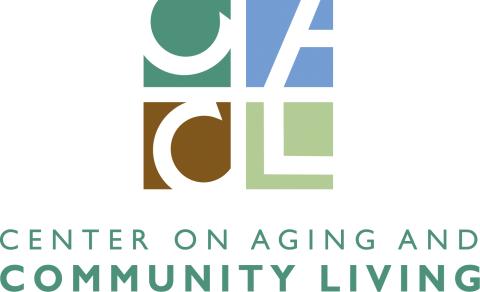
The Center on Aging and Community Living (CACL) is a collaboration between the Institute on Disability (IOD) and the Institute for Health Policy and Practice (IHPP) at the University of New Hampshire (UNH). CACL provides support to various partners in the aging network by designing, implementing, and evaluating systems change initiatives. CACL staff accomplish this by maximizing resources and focusing on quality and best practices relevant to aging and community living. Read on to discover examples of CACL’s extensive portfolio:
Senior Leadership Series and Senior Leadership Alumni Network
The Senior Leadership Series is a collaboration between UNH’s Center on Aging and Community Living, AARP NH, and the Dartmouth Centers for Health and Aging. The Senior Leadership Series focuses on further developing a network of grassroots advocates on both a regional and state level to build a stronger advocacy base for older people in New Hampshire.
Age of Champions
Age of Champions is an annual health fair held by the CACL and the UNH Department of Recreational Management and Policy (RMP). The event promotes holistic and intergenerational approaches to healthy aging and connects students with the community. Students from every department at the UNH College of Health and Human Services participate, and the intergenerational event grows every year.
NH DHHS Bureau of Elderly and Adult Services partners with IHPP for project management, program evaluation, and training for NH’s Aging and Disability Resource Centers. Key projects include:
Money Follows the Person Technical Assistance
IHPP is currently providing targeted technical assistance to the Bureau of Elderly and Adult Services as the Money Follows the person program is revamped in New Hampshire. Along with assisting with the operational protocol development for the program and assisting with facilitating the program's Consultative Group, IHPP staff are coordinating with the UNH Survey Center to launch the National Core Indicators - Aging and Disabilities (NCI-AD) Survey across the state. NCI-AD is a tool used by the states to measure and track their own performance in delivering services and supports to aging adults with disabilities. Indicators address key areas of concern, including service planning, rights, community inclusion, choice, health and safety, and relationships. The survey will focus on participants of the Choices for Independence Medicaid wavier and will ask participants directly about their experiences. The survey is set to be launched at the beginning of 2024.
The Institute for Health Policy and Practice (IHPP) has partnered with the NH DHHS and community-based organizations on a variety of care transitions grants and projects.
Project ECHO: Aging, Community, and Equity
The Institute for Health Policy and Practice, in collaboration with Medical Care Development, uses the Project ECHO® model to cultivate a learning community focused on the impacts of the COVID-19 pandemic on the well-being of older adults in rural communities. Past series have looked at the impacts of social isolation and loneliness and have explored the intersections of cognition, COVID, and aging using a framework known as “The 4Ms of Age-Friendly Health Systems.” The next series, launching in February 2024, will focus on strategies, tools, and special considerations for honoring individuals’ end-of-life preferences.
Resources and Publications
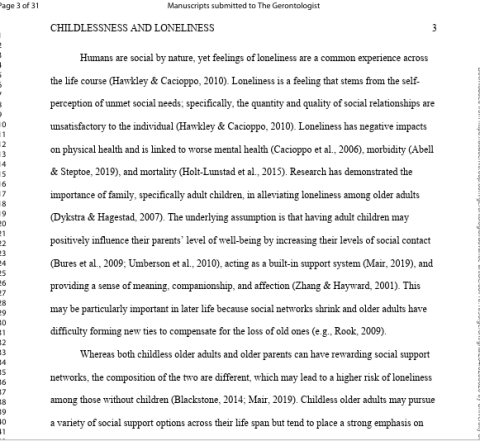
The Association Between Childlessness and Loneliness in Later Life: Does Friendship Play a Moderating Role?
September 2025
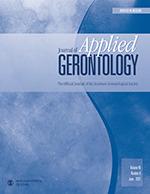
Collecting, Sharing, and Using Information for Person-Centered Dementia Care: Perspectives of Residents, Care Partners, and Staff in Low-Resource Long-Term Care Settings
August 2025
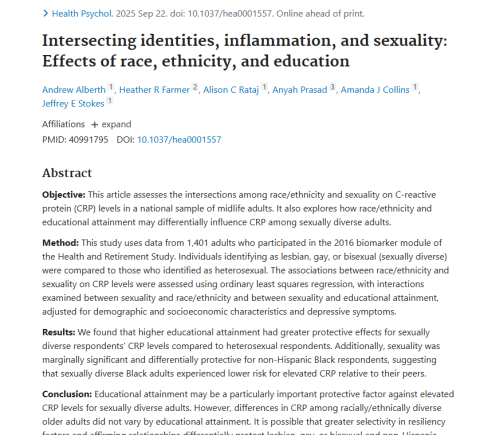
Intersecting identities, inflammation, and sexuality: Effects of race, ethnicity, and education
September 2022
Intersecting identities, inflammation, and sexuality: Effects of race, ethnicity, and education

COVID-19 Factors Associated With Medication Changes Among Nursing Home Residents With Dementia
April 2025
COVID-19 Factors Associated With Medication Changes Among Nursing Home Residents With Dementia
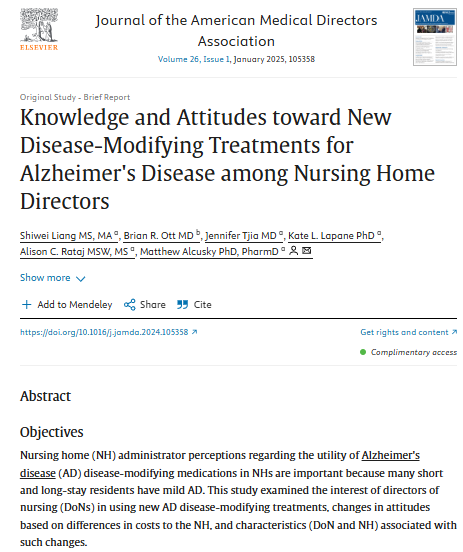
Knowledge and Attitudes toward New Disease-Modifying Treatments for Alzheimer's Disease among Nursing Home Directors
January 2025
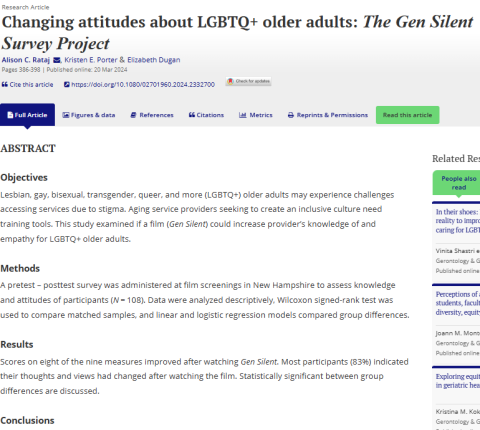
Changing attitudes about LGBTQ+ older adults: The Gen Silent Survey Project
March 2024
Lesbian, gay, bisexual, transgender, queer, and more (LGBTQ+) older adults may experience challenges accessing services due to stigma. Aging service providers seeking to create an inclusive culture need training tools. This study examined if a film (Gen Silent) could increase provider’s knowledge of and empathy for LGBTQ+ older adults.
Changing attitudes about LGBTQ+ older adults: The Gen Silent Survey Project
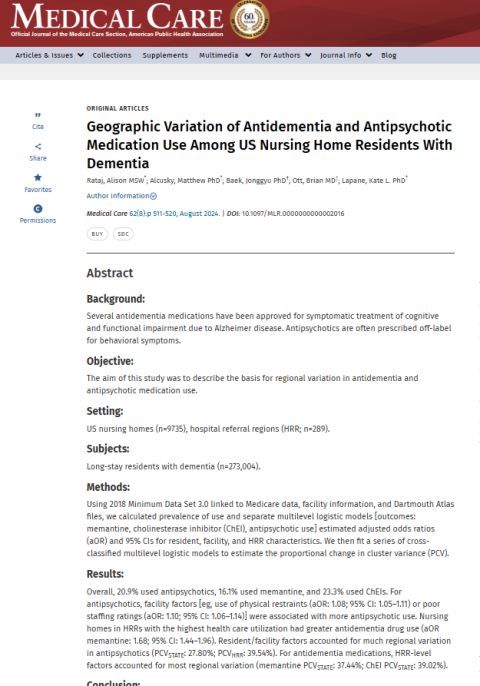
Geographic Variation of Antidementia and Antipsychotic Medication Use Among US Nursing Home Residents With Dementia
August 2024
Several antidementia medications have been approved for symptomatic treatment of cognitive and functional impairment due to Alzheimer disease. Antipsychotics are often prescribed off-label for behavioral symptoms.
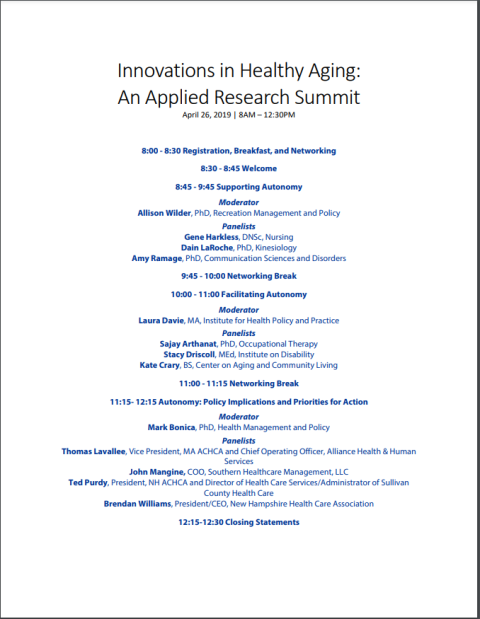
April 2019
UNH College of Health and Human Services held a half-day summit of learning, networking, and exploration regarding long term care research. Sessions focused on current trends in research and the practical application of solutions from both a direct care and systems-based perspective.
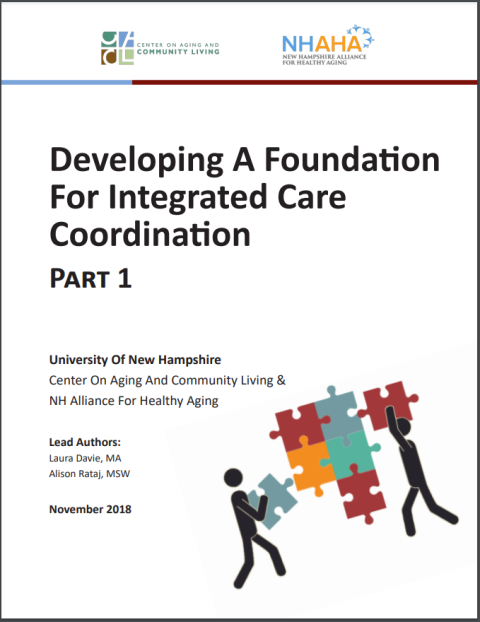
November 2018
While everyone’s natural process of aging is different, most individuals will need some form of assistance as they age. This might include medical attention, help with meals, or receiving assistance with daily activities – and often includes several different services, simultaneously. Trying to keep up with medical and social needs requires coordination and communication among systems of care. In the absence of integrated coordination, people can have inefficient, frustrating, and even unsafe experiences. Given this landscape, systematic support as people age is critically important.
Developing a Foundation for Integrated Care Coordination: Part 1
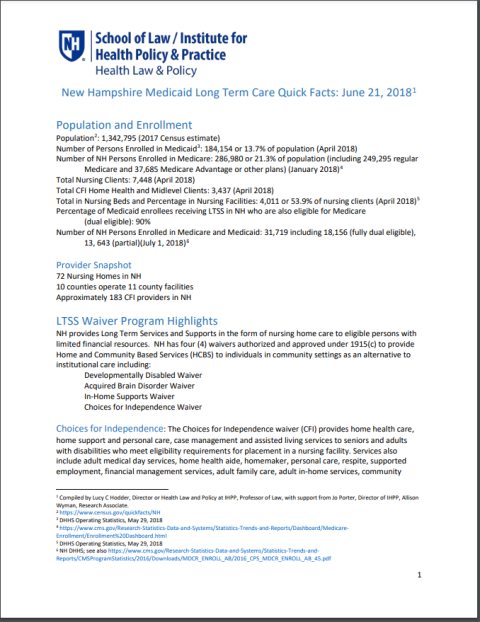
June 2018
NH health insurance coverage data showcase as of June 2018.
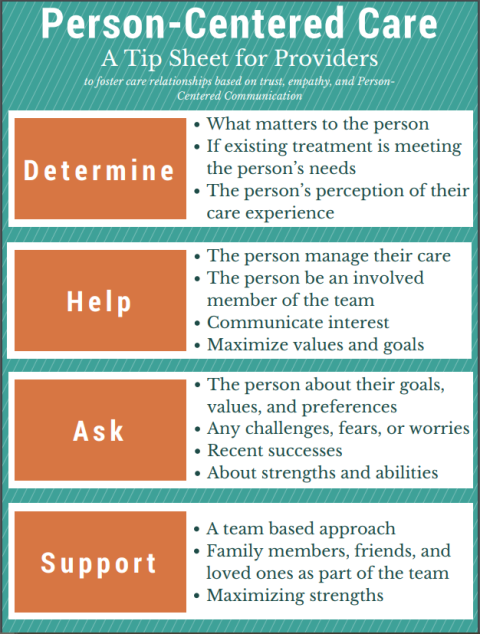
July 2016
The physician-patient relationship has always been centered around the physician, with the Center on Aging and Community Living's "Person-Centered Care" video the relationship is reversed. Learn more about the benefits of the physician-patient relationship getting reversed.
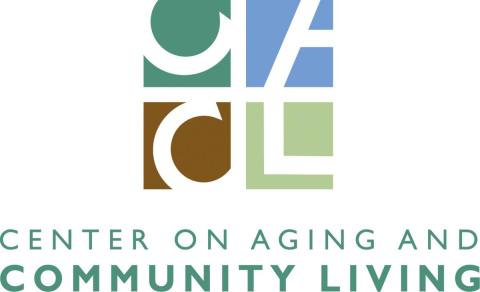
July 2017
The following video was created as part of a training for the Practice Transformation Network. The training focuses on person-centered care transitions in a medical neighborhood.

December 2015
Citizens in the U.S. are making organized efforts to demand a new approach to planning urban communities, one that results in more sustainable and livable communities. The profession of social work in the U.S. once had a primary role in organizing urban residents to advocate for healthier environments in their neighborhoods. Yet, recent research documents the diminishing emphasis on community organization as an intervention method in social work. This paper offers a descriptive case study of a successful community organizing effort to promote a more livable city in Portland, Maine (USA).
A Case Study in Organizing for Livable and Sustainable Communities
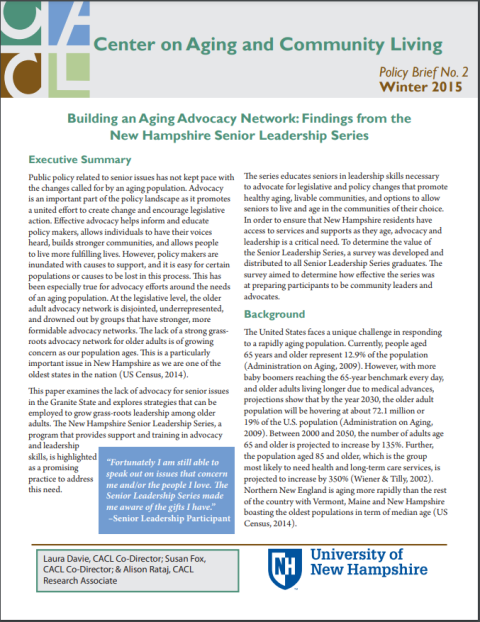
Winter 2015
This paper examines the lack of advocacy for senior issues in the Granite State and explores strategies that can be employed to grow grass-roots leadership among older adults. The New Hampshire Senior Leadership Series, a program that provides support and training in advocacy and leadership skills, is highlighted as a promising practice to address this need.
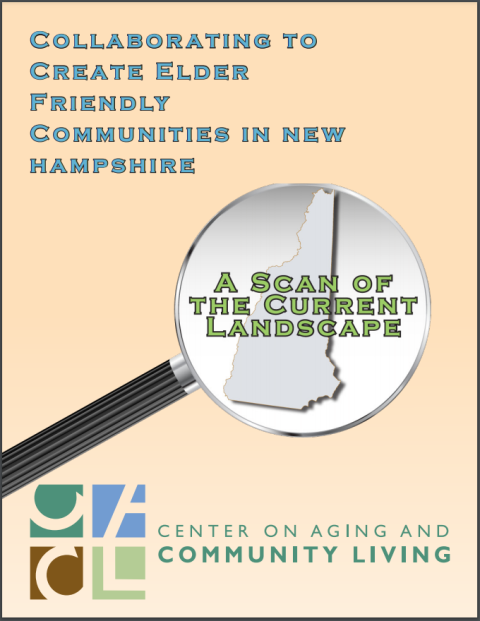
September 2015
In a collective impact approach, the work begins with a shared understanding of the key challenges and opportunities before us and a commitment to solving it together through agreed upon actions and strategies. The process starts with mapping the landscape. This significant work by the Center on Aging and Community Living (CACL) at the University of New Hampshire is a knowledge base from which we will create shared goals, identify existing and emerging strategies and set a course for creating the elder-friendly communities we all want to live in as we age.
Environmental Scan to Help Create Elder-Friendly Communities in NH
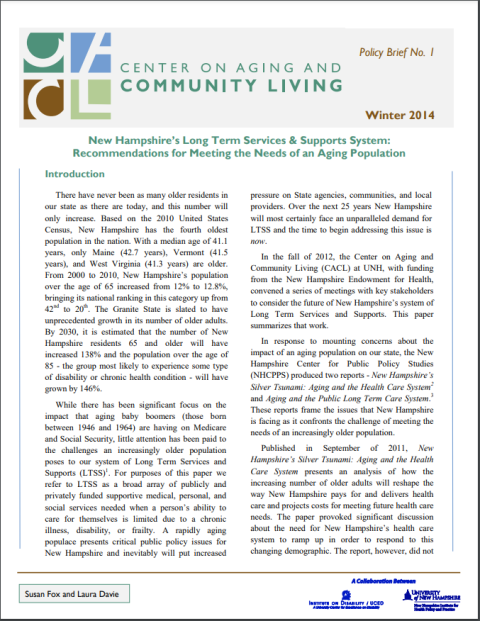
Winter 2014
In the fall of 2012, the Center on Aging and Community Living (CACL) at UNH, with funding from the New Hampshire Endowment for Health, convened a series of meetings with key stakeholders to consider the future of New Hampshire’s system of Long Term Services and Supports. This paper summarizes that work. In response to mounting concerns about the impact of an aging population on our state, the New Hampshire Center for Public Policy Studies (NHCPPS) produced two reports - New Hampshire’s Silver Tsunami: Aging and the Health Care System; and Aging and the Public Long Term Care System. These reports frame the issues that New Hampshire is facing as it confronts the challenge of meeting the needs of an increasingly older population.
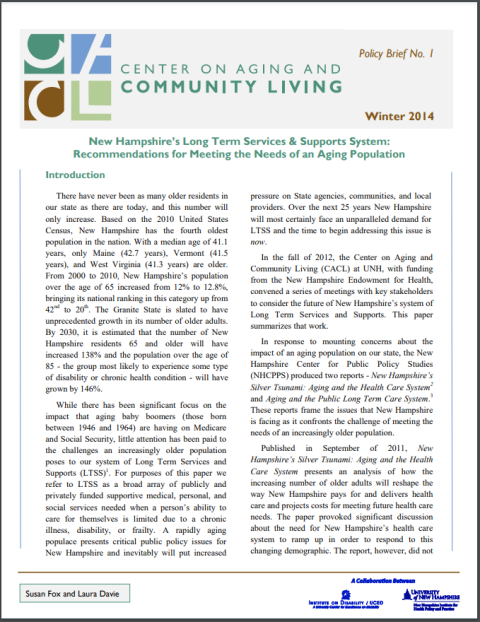
Winter 2014
In the fall of 2012, the Center on Aging and Community Living (CACL) at UNH, with funding from the New Hampshire Endowment for Health, convened a series of meetings with key stakeholders to consider the future of New Hampshire’s system of Long Term Services and Supports. This paper summarizes that work. In response to mounting concerns about the impact of an aging population on our state, the New Hampshire Center for Public Policy Studies (NHCPPS) produced two reports - New Hampshire’s Silver Tsunami: Aging and the Health Care System; and Aging and the Public Long Term Care System. These reports frame the issues that New Hampshire is facing as it confronts the challenge of meeting the needs of an increasingly older population.